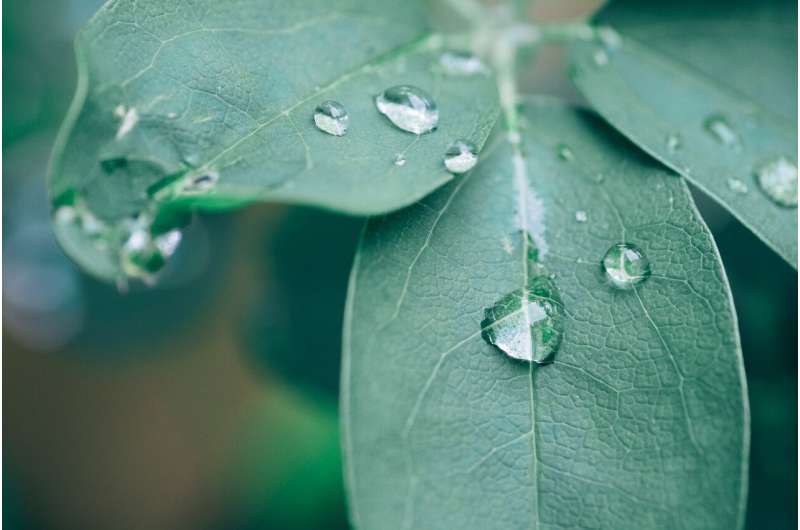Impact of water droplets on leaves quickly triggers stress responses in plants

In contrast to humans, plants cannot feel pain. However, so-called mechanical stimulation—rain, wind and physical impact from humans and animals—contributes to the activation of a plant's defence system at a biochemical level. This in turn triggers a stress hormone that, among other things, can lead to the strengthening of a plant's immune system.
The new study confirms the results of previous research. However, this time the researchers looked at molecular changes on a much larger scale—genome-wide—and focused on the role and regulation of the plant hormone jasmonic acid.
The researchers found that thousands of genes, hundreds of proteins and many growth hormones are affected within t just ten minutes following water hitting the leaf surface of a plant. They also discovered a never seen before regulatory network that affects how the plant's defence hormones are strengthened by mechanical stimulation.
"This type of stimulation can lead to a delay in the flowering of plants and stunted growth. However, we can now show that the plant also has an increased immune response to certain pathogens and that the plant's biochemical changes are measureable after a very short period of time," says Olivier Van Aken, biology researcher at Lund University and leader of the study.
In experiments carried out in laboratory environments, the researchers used a common plant spray bottle set on a soft spray. The plants were showered once from a distance of 15 centimetres after which the researchers registered the molecular changes at the cellular level at several points in time after the treatment.
"Our results show that plants are very sensitive and do not need heavy rain to be affected and alerted at a biochemical level," says Olivier Van Aken.
But why do plants react so strongly and quickly to drops of water? The research team says it may be a defence mechanism. When it rains heavily, water droplets that rebound from plants infected with bacteria, fungi and viruses can hit healthy plants.
"The sick leaves can act as a catapult and in turn spread smaller droplets with pathogens to plants several metres away. It is possible that the healthy plants close by want to protect themselves," says Olivier Van Aken.
The research team says that mechanical stimulation plays a much more significant role than was previously believed, and that different kinds of physical impact can affect plants both positively and negatively depending on the plant's age and growing conditions. Which practical application could these new findings have then?
"We are currently studying an old Japanese agricultural technique that is based on treading down grains during the growth phase to achieve more abundant crop production. I think there is a lot more to learn about how mechanical stimulation affects plants, knowledge which may have significant consequences for agriculture in the future," says Olivier Van Aken.
More information: Alex Van Moerkercke et al, A MYC2/MYC3/MYC4-dependent transcription factor network regulates water spray-responsive gene expression and jasmonate levels, Proceedings of the National Academy of Sciences (2019). DOI: 10.1073/pnas.1911758116
Journal information: Proceedings of the National Academy of Sciences
Provided by Lund University




















